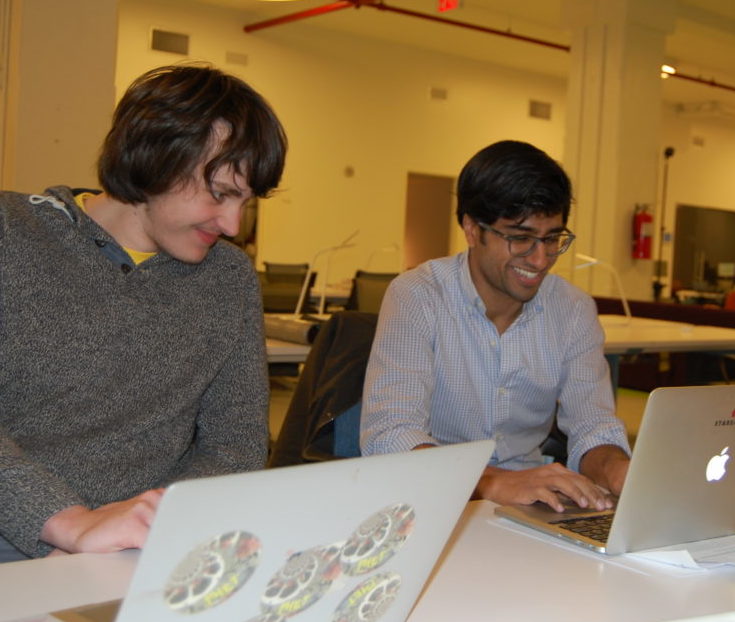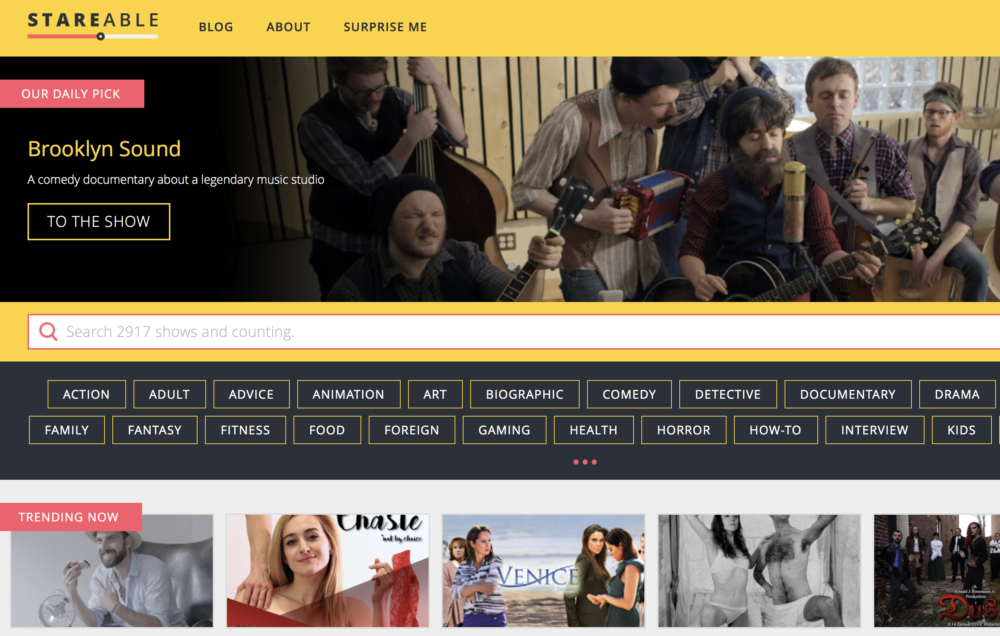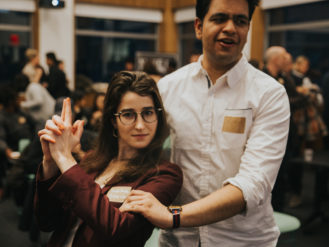A Smart New Portal into the World of Web TV
A Brooklyn internet startup, Stareable, is the answer to fear of missing out, guiding viewers to more than 2,900 shows
The site offers 36 categories to browse, plus what’s trending, recommendations for individual viewers and a “surprise me” button (Image courtesy of Stareable)
Ajay Kishore had a job in finance, analyzing tech stocks and not particularly loving it, when he was drawn to a TimeOut New York article about the 50 “best and funniest Web series.” Fifty! Out of what expanding universe? he wondered. Kishore already loved shows like Comedians in Cars Getting Coffee and Between Two Ferns, but the list gave him a sense of what he was missing. Web TV, unlike the mainstream stuff that arrives through your cable box, is a whole new realm of mainly free, episodic programs that come streaming into your device through the internet. If you can find them.
That was inspiration enough for Kishore, then 30, to quit his job and launch his own business to help viewers discover what’s out there. “There was something irresistible about exploring it and seeing what I could make of it.”
What he made was Stareable, which launched in June 2016 as an online guide to the new world of web TV. Today it provides a well-sorted compendium of 2,917 (and counting) internet shows, reviewed by its readers and contributors. The site offers 36 categories to browse, from mystery to sports to LGBT, plus what’s trending, recommendations for individual viewers and a “surprise me” button.

Stareable founder Kishore, at right, with Austin Glugla, the site’s new lead developer and resident machine-learning expert, who’s working on improving the recommendation engine (Photo by Steve Koepp)
Stareable arrives as a new industry takes shape around web TV, which now has its own festivals and programs like the Streamy Awards. Stareable is hosting its own inaugural screening series in Dumbo on Mon., March 27, featuring episodes from internet shows including Killing it and Rare Birds of Fashion.
The Fast Rise of Web TV
How did internet TV get so prolific so fast? Kishore cites several technological breakthroughs: “Faster internet speeds, portable devices that allow you to consume video everywhere, and digital production costs dropping 90%,” he says. At the same time, “the rise of social networks empowered users to create and share, when historically they just expected to consume.’” Brooklyn’s BRIC, the arts organization, has made a big push into web TV, currently listing 19 shows on its BRIC TV site.
Typically much quirkier than mainstream stuff, web TV is now growing up and diversifying. “Historically there was a frequent focus on young, urban, childless adults with roommates and unsatisfying jobs, often because that’s who was making them,” says Kishore. “Similarly, a disproportionate number of them focused on comedy, because it relies on strength of writing rather than production costs. But we’re starting to see more in other genres–horror, sci-fi, dramas, romance–and other settings and character types. Because web series bypass Hollywood’s narrow lens, they often tackle much more diverse and under-represented voices and communities.”
Web shows have tended to be shorter than mainstream programs and geared toward the 15-to-30 age group, but the content has been growing more substantial. “Episode lengths are definitely getting longer, says Kishore. “A couple years ago, the average length of a video on YouTube was under five minutes. It’s creeping higher. A stat that I find staggering: the average mobile YouTube experience is 40 minutes long. And YouTube is pushing creators to create longer content because they know the audience appetite is there.”
How He Got Started
Kishore, a Maryland native, says that his parents repeatedly warned him that TV was going to “rot my brain.” He went on to study economics and electrical engineering at Yale, then spent a decade in finance. He launched Stareable with help from friends-and-family funding, setting up shop in Dumbo’s Made in New York Media Center, a city-affiliated startup incubator. (The Bridge operates out of the same co-working space.) As the site evolves, he’s working towards raising a seed round of new capital to pay for enhancements. “We’re currently working on improving our Netflix-style recommendation engine, which learns as you watch and review shows so we can help you discover great new content.”

The site includes a “surprise me” button that’s surprisingly popular (Image courtesy of Stareable)
In the nearly two years since Kishore had his breakthrough idea, he and his small team have learned a few valuable lessons about building something from scratch. Among them: “We do something at most team meetings, which is an airing of grievances,” says Kishore. “It’s meant to keep the lines of communication open and encourage honest and open feedback. We’ve had good ideas come out of these. I’m a big fan of candor in the workplace.”
Stareable maintains a dialog with video-makers as well, aiming to foster a community around web TV. Videos on the site show how you can make your own web series. Then, once you’ve wrapped, you can check the handy calendar for entering the internet-TV festivals like Dublin’s DubWebFest. Stareable has created a blog as an industry resource, along with several weekly newsletters.
What should Brooklynites watch? Stareable covers quite a few shows that might have special, local appeal. Kishore, who calls himself “Chief Stare-Master,” recommends a few favorites: Brooklynification, Shugs and Fats, The Show about the Show and High Maintenance, which moved from web TV to HBO. Stareable offers a daily pick, which this week included Brooklyn Sound, a faux-documentary series about a legendary music studio. One 10-minute episode features a hillbilly-hipster band called Josiah and the Teeth, some of whose members are missing theirs. The earnest sound engineer in a knit cap testifies that “some of the all-time best albums were recorded here,” displaying a series of LP covers. “Oh, Julianne Lorne, Osteoporosis. It’s beautiful. This is actually my mom’s copy. I’m never giving it back.” As for Kishore’s own parents and his new career? “I think they’ve since come to terms with it, but I’m not sure.”













